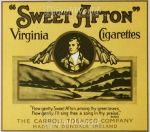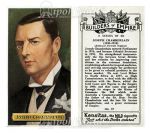We've tried to ensure the information displayed here is as accurate as possible. Should there be any inaccuracies, we would be grateful if you could let us know at info@ipohworld.org . All images and content are copyright.
(Please click on the thumbnail for a bigger image.)
Three Cigarette Packets And A Cigarette Card




These three packets are with the inner tray but without cigarettes. The Kensitas Cigarette Card is a scan provided by Ipoh Remembered,
Kensitas Extra Size
Manufactured by J Wix and Sons, the company being founded by Julius Wix.
Mr. Julius Wix was born in Russia in 1860 and started his career in a tobacco factory at the age of 10. In 1889 he came to London where he worked for various firms including Messrs. Melinsky, Messrs. John Scholey, and Messrs. Bateman as a tobacco cutter and blender for the first few years.
He then joined Messrs. Drapkin & Milhoff and was the original blender of such brands as ‘Pick-me-ups’ and ‘De Reszke Tenor’.
In 1897 he became one of the original founders and partners of Major Drapkin & Co, but sold his interest in 1901 and began business on his own account initially at 25 Buckle Street, Whitechapel, London and after several moves at 234 / 248 Old Street, London where he remained for 10 years. Factories were situated at Livingstone Road, E15, and also at Hurst Green.
Julius Wix retired from active business in September 1927 after selling his interests in J. Wix & Sons Limited to the American Tobacco Company. He died on November 10, 1933. The Kensitas brand was acquired by Gallaher Limited in 1962 and still flourishes.
We believe his wife Annie Wix, dird in Bournemouth in 1951.
There are a couple of legends about the name Kensitas. Some say its a corruption of Kensington, for it was at Barker’s store in Kensington that Wix first sold what were to become Kensitas. Another source has it that Julius Wix spoke only German and would wander around muttering "Kenen sie das?" (Do you know that?) and that this became Kensitas.
The Malayan agents for Kensitas were Huttenbach Lazarus And Sons Ltd. with premises in Station Road, Ipoh.
Ipoh Remembered advises:
Julius Wix was a Ukrainian Jew. He spoke no German.
He also provided the cigarette card that features the famous British Statesman Joseph Chamberlain, originally enclosed in a Kensitas packet.
Out of many Kensitas cards I sent Joseph Chamberlain particularly for the Ipoh connection: there is, or used to be, an old road named after him. It's true that part of that road was re-named decades ago for Chung Thye Phin, but isn't the rest of it still there for Chamberlain?
Editor's Mote:
Yes Jalan Chamberlain (named Chamberlain Street in 1907) is still there, Postcode 30250
Joseph Chamberlain (8 July 1836 – 2 July 1914) was a British statesman who was first a radical Liberal, then, after opposing home rule for Ireland, a Liberal Unionist, and eventually served as a leading imperialist in coalition with the Conservatives. He split both major British parties in the course of his career. Despite never becoming Prime Minister, he was one of the most important British politicians of his day.
Cigarette cards are defined as "trade cards issued by tobacco manufacturers to stiffen cigarette packaging and advertisecigarette brands." They are normally double-sided with a picture on the front and description on the reverse.
Sweet Afton
Sweet Aftonwas an Irish brand of short, unfilteredcigarettes made with Virginia tobacco and produced by P.J. Carroll & Co., Dundalk, Ireland, now a subsidiary of British American Tobacco.
The Sweet Afton brand was launched by Carroll's in 1919 to celebrate the link between Dundalk and the national poet of Scotland, Robert Burns. Burns' eldest sister, Agnes, lived in Dundalk from 1817 until her death in 1834 and was buried in the cemetery of St. Nicholas's Church in the town. Carroll's thought that the brand would only be successful in Scotland if the carton simply had an image of Burns, or Scottish name on the packet, so the people of Dundalk were canvassed and the name Sweet Afton was chosen, the name is taken from Burns' poem "Sweet Afton", which itself takes its title from the poem's first stanza.
P. J. Carroll & Company Limited, often called Carroll's, was Ireland's oldest tobacco manufacturer. Its cigarette brands were among the best selling in Ireland in the twentieth century. Its factory was for decades the largest employer in Dundalk. The Company was founded by Patrick James Carroll in the North East town of Dundalk over 190 years ago. P. J. Carroll grew from a small shop to be one of the largest employers in the Dundalk region. The Dundalk site closed in 2008 and the factory became the campus of the Dundalk Institute of Technology.
Piccadilly No 7
First produced in 1960 by the House of Piccadily, part of the House pf Carreras Compny The House of Carreras was a tobacco business that was established in London in the nineteenth century by a nobleman from Spain, Don José Carreras Ferrer. It continued as an independent company until November 1958, when it merged with Rothmans of Pall Mall. In 1972 the name was used as the vehicle for the merger of various European tobacco interests to form Rothmans International.
Carreras's made a range of famurite brands and their Regent Street store was visited by royalty from many lands and as early as 1866 he received Royal Warrants from HRH The Prince of Wales and HRH the Duke of Saxe-Coburg-Gotha. Shortly after in 1874, Carreras received a Warrant from His Majesty King Alfonso XII of Spain. The hand-written sales ledgers of this period show accounts held by nobility, statesmen, men of letters and high-ranking service officers.
J. M. Barrie, the famous novelist and author, was a valued customer during the 1890s. When he wrote My Lady Nicotinewhich was published in 1890, he referred to a mythical tobacco called Arcadia Mixture. It was not long before Carreras realised that Barrie's sole supply of tobacco was the Craven Mixture he sold at Wardour Street, and in January 1897 Barrie confirmed to Don Jose that Arcadia Mixture and Craven Mixture were one and the same. Shortly afterwards, Carreras began using Barrie's endorsement in his advertising and Craven Mixture benefited as sales at home and abroad increased rapidly.
Read more about Huttenback, Lazarus & Sons Ltd here.